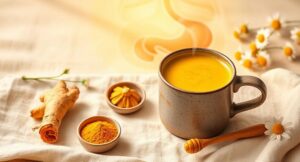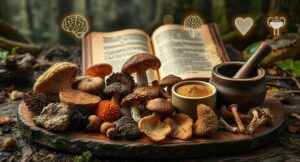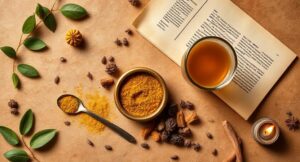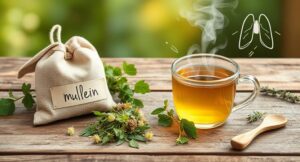

Natural Remedies to Boost Immunity and Heal at Home: 9 Time-Tested Herbal Allies You Should Know


Arya Soleil
When it comes to staying healthy, sometimes the most effective remedies aren’t found in a pharmacy—but in your kitchen cabinet, garden, or pantry. For generations, people have relied on natural remedies to soothe colds, boost immunity, ease pain, and support healing without harsh chemicals.
Whether you’re looking to build a natural first-aid kit, reduce your dependence on over-the-counter drugs, or simply live closer to the earth, this blog covers 9 traditional herbal remedies you can keep on hand to care for common everyday ailments.
Let’s explore these nature-powered wellness tools, what they’re used for, and how to make or use them safely and effectively.
Elderberry Syrup: Immune-Boosting Cold Fighter
Elderberry syrup is one of the most popular and effective natural remedies for supporting the immune system—especially during cold and flu season. Elderberries are packed with antioxidants, vitamin C, and flavonoids that help reduce the duration and severity of viral infections.
Studies have shown that elderberry extract may shorten the duration of colds and flu by up to 4 days if taken at the first sign of illness. It works by inhibiting viral replication and enhancing immune defense.
How to use it:
Take 1–2 teaspoons daily for prevention or every 2–3 hours during illness. Elderberry syrup can be made at home using dried elderberries, cinnamon, ginger, and raw honey.
Caution: Never eat raw elderberries, as they can be toxic. Always cook them thoroughly.
Fire Cider: Spicy Tonic for Circulation and Immunity
Fire cider is a pungent herbal tonic traditionally made with raw apple cider vinegar, garlic, onion, horseradish, ginger, cayenne, turmeric, and herbs. It’s used to stimulate circulation, clear congestion, and boost immune function during cold weather or when you feel under the weather.
Fire cider warms the body, breaks up mucus, and delivers a potent punch of antimicrobial compounds that help fight infection and inflammation.
How to use it:
Take 1–2 tablespoons daily as a preventive or every few hours when sick. Dilute in water, mix with juice, or drizzle over salads for a zesty kick.
Bonus tip: Make a big jar in autumn to prep your immune system for winter.
Echinacea Tincture: Infection Fighter and Immune Modulator
Echinacea is a flowering herb known for its ability to stimulate white blood cells and enhance immune response. It’s most effective when taken at the very first sign of infection to help the body mount a faster, stronger defense.
It’s commonly used for respiratory infections, sore throats, and early cold symptoms, and may also help reduce inflammation in the body.
How to use it:
Take echinacea as a tincture (liquid extract), 1–2 dropperfuls every 2–3 hours at the onset of symptoms. You can also take it in capsule form, though tinctures absorb more quickly.
Note: It’s best used short-term—5 to 10 days—rather than for ongoing daily use.
Ginger Decoction: Circulation Booster and Antiviral
Ginger isn’t just for upset stomachs—it’s also a powerful antiviral and circulatory stimulant. Ginger root helps increase blood flow, reduce inflammation, relieve nausea, and break fevers.
As a warming herb, ginger is ideal for people who run cold or feel chilled during illness. Its antimicrobial properties also help kill off pathogens and support detoxification.
How to use it:
Slice or grate fresh ginger and simmer in water for 15–20 minutes to make a potent ginger decoction. Add honey and lemon for taste. Drink 1–3 cups per day during illness or when you need a circulation boost.
Ginger tea can also be combined with turmeric, cinnamon, and cayenne for a spicy, immune-supporting tonic.
Chamomile Tea: Anti-Inflammatory and Calming
Chamomile is a gentle but powerful herb used for centuries to calm the nerves, soothe digestion, and support immune health. It contains apigenin, a flavonoid with anti-inflammatory, antispasmodic, and mild sedative effects.
Chamomile tea is especially helpful for:
Calming anxiety
Supporting restful sleep
Easing bloating and indigestion
Helping fussy children relax during illness
How to use it:
Steep 1 tablespoon of dried chamomile flowers in hot water for 5–10 minutes. Drink before bed, during illness, or when feeling anxious or tense. Safe for kids and adults.
Sore Throat Pastilles: Soothing Lozenges for Irritated Throats
Sore throat pastilles are herbal lozenges made with demulcent (mucilage-rich) herbs like slippery elm, marshmallow root, and licorice, which coat and soothe irritated throat tissues.
They’re often combined with honey, ginger, or essential oils for additional antimicrobial and anti-inflammatory benefits.
How to use it:
Suck on one pastille every 2–3 hours as needed for throat pain, dryness, or hoarseness. You can purchase natural pastilles from health stores or make your own using powdered herbs and honey.
Bonus: Some formulas also help with dry cough and mouth ulcers.
Calendula Salve: Skin Healer for Cuts, Scrapes, and Rashes
Calendula is a vibrant yellow flower known for its wound-healing and antimicrobial properties. When infused into oil or turned into a salve, calendula can help speed up skin repair, soothe irritation, and prevent infection.
It’s ideal for:
Cuts and scrapes
Diaper rash
Eczema
Bug bites
Chafed skin
How to use it:
Apply calendula salve 1–2 times daily to clean, dry skin. Keep a small tin in your natural first-aid kit for on-the-go skin support.
You can make it at home by infusing calendula flowers in olive oil and combining with beeswax to form a soothing balm.
Mullein Flower Earache Oil: Natural Support for Ear Infections
Mullein flowers have a long tradition of use in soothing ear pain, reducing inflammation, and fighting mild infections. Combined with garlic oil or olive oil, mullein can be applied directly into the ear to reduce discomfort and pressure.
It’s especially helpful for children or anyone prone to recurring earaches.
How to use it:
Warm a few drops of mullein flower oil to body temperature and apply to the affected ear while lying down. Do not use if the eardrum is ruptured or there’s drainage—always consult a healthcare professional if unsure.
Arnica Salve: First-Aid Essential for Bruises, Sprains, and Swelling
Arnica is a powerful herb used topically to relieve bruising, muscle aches, sprains, and swelling. It helps stimulate circulation, reduce inflammation, and accelerate the healing of soft tissue injuries.
Note: Arnica should never be taken internally unless in homeopathic form.
How to use it:
Apply arnica salve to sore muscles, bruises, or areas of swelling 2–3 times daily. Avoid open wounds or broken skin.
Arnica is a favorite among athletes and anyone prone to bumps and strains.
How to Build Your Own Herbal First-Aid Kit
Whether you’re a parent, traveler, or health-conscious person, having a go-to stash of natural remedies can help you feel more empowered and prepared.
Start with these essentials:
Immune Support: Elderberry syrup, fire cider, echinacea tincture
Digestive and Cold Care: Ginger, chamomile, sore throat pastilles
Skin and Muscle Relief: Calendula salve, arnica salve, mullein oil
Tools: Dropper bottles, jars, small tins, herbal teas, and labels
Store your herbal remedies in a cool, dry place, and label each item with the name and expiration date. Most herbal tinctures and oils last for at least 1 year if stored properly.
Safety Notes When Using Herbal Remedies
While herbs are natural, they are also powerful and should be used mindfully.
Consult your doctor if you’re pregnant, breastfeeding, on medications, or managing chronic conditions
Start with small doses and observe how your body responds
Always buy herbs from trusted sources and avoid wild-harvesting unless you’re trained
Use external remedies (like salves and oils) only on unbroken skin
Final Thoughts: Healing Doesn’t Always Come in a Bottle
Sometimes the most effective forms of healing come not from a prescription, but from a teacup, a tincture bottle, or a jar of hand-poured salve. The remedies listed above connect us to an ancient tradition of self-care that’s rooted in nature, simplicity, and the body’s innate ability to heal.
Whether you’re easing a sore throat with ginger decoction or massaging arnica into a bruise, you’re not just treating symptoms—you’re nurturing your body, building resilience, and practicing everyday empowerment.
So next time you feel a tickle in your throat or a bump on your shin, skip the chemical-laden cabinet and reach for nature’s wisdom instead.
Recommended Reads

- June 9, 2025
Castor Oil in the Navel: A Forgotten Practice That Supports Digestion and Sleep
Home News Healthy Habits & Lifestyle Health Conditions &...


- June 9, 2025
Turmeric for Ulcers: A Natural Way to Soothe and Protect Your Stomach
Home News Healthy Habits & Lifestyle Health Conditions &...


- June 9, 2025
The Healing Power of Castor Oil Compresses: A Natural Therapy for Detox, Sleep, and Circulation
Home News Healthy Habits & Lifestyle Health Conditions &...


- June 9, 2025
Medicinal Mushrooms: Ancient Remedies with Modern Benefits
Home News Healthy Habits & Lifestyle Health Conditions &...


- June 9, 2025
Triphala: The Ancient Herbal Blend That Supports Digestion, Detox, and Longevity
Home News Healthy Habits & Lifestyle Health Conditions &...


- June 9, 2025
Mullein: Herbal Support for Lung Health and Clear Breathing
Home News Healthy Habits & Lifestyle Health Conditions &...

Natural Remedies to Boost Immunity and Heal at Home: 9 Time-Tested Herbal Allies You Should Know

When it comes to staying healthy, sometimes the most effective remedies aren’t found in a pharmacy—but in your kitchen cabinet, garden, or pantry. For generations, people have relied on natural remedies to soothe colds, boost immunity, ease pain, and support healing without harsh chemicals.
Whether you’re looking to build a natural first-aid kit, reduce your dependence on over-the-counter drugs, or simply live closer to the earth, this blog covers 9 traditional herbal remedies you can keep on hand to care for common everyday ailments.
Let’s explore these nature-powered wellness tools, what they’re used for, and how to make or use them safely and effectively.
Elderberry Syrup: Immune-Boosting Cold Fighter
Elderberry syrup is one of the most popular and effective natural remedies for supporting the immune system—especially during cold and flu season. Elderberries are packed with antioxidants, vitamin C, and flavonoids that help reduce the duration and severity of viral infections.
Studies have shown that elderberry extract may shorten the duration of colds and flu by up to 4 days if taken at the first sign of illness. It works by inhibiting viral replication and enhancing immune defense.
How to use it:
Take 1–2 teaspoons daily for prevention or every 2–3 hours during illness. Elderberry syrup can be made at home using dried elderberries, cinnamon, ginger, and raw honey.
Caution: Never eat raw elderberries, as they can be toxic. Always cook them thoroughly.
Fire Cider: Spicy Tonic for Circulation and Immunity
Fire cider is a pungent herbal tonic traditionally made with raw apple cider vinegar, garlic, onion, horseradish, ginger, cayenne, turmeric, and herbs. It’s used to stimulate circulation, clear congestion, and boost immune function during cold weather or when you feel under the weather.
Fire cider warms the body, breaks up mucus, and delivers a potent punch of antimicrobial compounds that help fight infection and inflammation.
How to use it:
Take 1–2 tablespoons daily as a preventive or every few hours when sick. Dilute in water, mix with juice, or drizzle over salads for a zesty kick.
Bonus tip: Make a big jar in autumn to prep your immune system for winter.
Echinacea Tincture: Infection Fighter and Immune Modulator
Echinacea is a flowering herb known for its ability to stimulate white blood cells and enhance immune response. It’s most effective when taken at the very first sign of infection to help the body mount a faster, stronger defense.
It’s commonly used for respiratory infections, sore throats, and early cold symptoms, and may also help reduce inflammation in the body.
How to use it:
Take echinacea as a tincture (liquid extract), 1–2 dropperfuls every 2–3 hours at the onset of symptoms. You can also take it in capsule form, though tinctures absorb more quickly.
Note: It’s best used short-term—5 to 10 days—rather than for ongoing daily use.
Ginger Decoction: Circulation Booster and Antiviral
Ginger isn’t just for upset stomachs—it’s also a powerful antiviral and circulatory stimulant. Ginger root helps increase blood flow, reduce inflammation, relieve nausea, and break fevers.
As a warming herb, ginger is ideal for people who run cold or feel chilled during illness. Its antimicrobial properties also help kill off pathogens and support detoxification.
How to use it:
Slice or grate fresh ginger and simmer in water for 15–20 minutes to make a potent ginger decoction. Add honey and lemon for taste. Drink 1–3 cups per day during illness or when you need a circulation boost.
Ginger tea can also be combined with turmeric, cinnamon, and cayenne for a spicy, immune-supporting tonic.
Chamomile Tea: Anti-Inflammatory and Calming
Chamomile is a gentle but powerful herb used for centuries to calm the nerves, soothe digestion, and support immune health. It contains apigenin, a flavonoid with anti-inflammatory, antispasmodic, and mild sedative effects.
Chamomile tea is especially helpful for:
Calming anxiety
Supporting restful sleep
Easing bloating and indigestion
Helping fussy children relax during illness
How to use it:
Steep 1 tablespoon of dried chamomile flowers in hot water for 5–10 minutes. Drink before bed, during illness, or when feeling anxious or tense. Safe for kids and adults.
Sore Throat Pastilles: Soothing Lozenges for Irritated Throats
Sore throat pastilles are herbal lozenges made with demulcent (mucilage-rich) herbs like slippery elm, marshmallow root, and licorice, which coat and soothe irritated throat tissues.
They’re often combined with honey, ginger, or essential oils for additional antimicrobial and anti-inflammatory benefits.
How to use it:
Suck on one pastille every 2–3 hours as needed for throat pain, dryness, or hoarseness. You can purchase natural pastilles from health stores or make your own using powdered herbs and honey.
Bonus: Some formulas also help with dry cough and mouth ulcers.
Calendula Salve: Skin Healer for Cuts, Scrapes, and Rashes
Calendula is a vibrant yellow flower known for its wound-healing and antimicrobial properties. When infused into oil or turned into a salve, calendula can help speed up skin repair, soothe irritation, and prevent infection.
It’s ideal for:
Cuts and scrapes
Diaper rash
Eczema
Bug bites
Chafed skin
How to use it:
Apply calendula salve 1–2 times daily to clean, dry skin. Keep a small tin in your natural first-aid kit for on-the-go skin support.
You can make it at home by infusing calendula flowers in olive oil and combining with beeswax to form a soothing balm.
Mullein Flower Earache Oil: Natural Support for Ear Infections
Mullein flowers have a long tradition of use in soothing ear pain, reducing inflammation, and fighting mild infections. Combined with garlic oil or olive oil, mullein can be applied directly into the ear to reduce discomfort and pressure.
It’s especially helpful for children or anyone prone to recurring earaches.
How to use it:
Warm a few drops of mullein flower oil to body temperature and apply to the affected ear while lying down. Do not use if the eardrum is ruptured or there’s drainage—always consult a healthcare professional if unsure.
Arnica Salve: First-Aid Essential for Bruises, Sprains, and Swelling
Arnica is a powerful herb used topically to relieve bruising, muscle aches, sprains, and swelling. It helps stimulate circulation, reduce inflammation, and accelerate the healing of soft tissue injuries.
Note: Arnica should never be taken internally unless in homeopathic form.
How to use it:
Apply arnica salve to sore muscles, bruises, or areas of swelling 2–3 times daily. Avoid open wounds or broken skin.
Arnica is a favorite among athletes and anyone prone to bumps and strains.
How to Build Your Own Herbal First-Aid Kit
Whether you’re a parent, traveler, or health-conscious person, having a go-to stash of natural remedies can help you feel more empowered and prepared.
Start with these essentials:
Immune Support: Elderberry syrup, fire cider, echinacea tincture
Digestive and Cold Care: Ginger, chamomile, sore throat pastilles
Skin and Muscle Relief: Calendula salve, arnica salve, mullein oil
Tools: Dropper bottles, jars, small tins, herbal teas, and labels
Store your herbal remedies in a cool, dry place, and label each item with the name and expiration date. Most herbal tinctures and oils last for at least 1 year if stored properly.
Safety Notes When Using Herbal Remedies
While herbs are natural, they are also powerful and should be used mindfully.
Consult your doctor if you’re pregnant, breastfeeding, on medications, or managing chronic conditions
Start with small doses and observe how your body responds
Always buy herbs from trusted sources and avoid wild-harvesting unless you’re trained
Use external remedies (like salves and oils) only on unbroken skin
Final Thoughts: Healing Doesn’t Always Come in a Bottle
Sometimes the most effective forms of healing come not from a prescription, but from a teacup, a tincture bottle, or a jar of hand-poured salve. The remedies listed above connect us to an ancient tradition of self-care that’s rooted in nature, simplicity, and the body’s innate ability to heal.
Whether you’re easing a sore throat with ginger decoction or massaging arnica into a bruise, you’re not just treating symptoms—you’re nurturing your body, building resilience, and practicing everyday empowerment.
So next time you feel a tickle in your throat or a bump on your shin, skip the chemical-laden cabinet and reach for nature’s wisdom instead.
Recommended Reads

- June 9, 2025
Castor Oil in the Navel: A Forgotten Practice That Supports Digestion and Sleep
Home News Healthy Habits & Lifestyle Health Conditions &...


- June 9, 2025
Turmeric for Ulcers: A Natural Way to Soothe and Protect Your Stomach
Home News Healthy Habits & Lifestyle Health Conditions &...


- June 9, 2025
The Healing Power of Castor Oil Compresses: A Natural Therapy for Detox, Sleep, and Circulation
Home News Healthy Habits & Lifestyle Health Conditions &...


- June 9, 2025
Medicinal Mushrooms: Ancient Remedies with Modern Benefits
Home News Healthy Habits & Lifestyle Health Conditions &...


- June 9, 2025
Triphala: The Ancient Herbal Blend That Supports Digestion, Detox, and Longevity
Home News Healthy Habits & Lifestyle Health Conditions &...


- June 9, 2025
Mullein: Herbal Support for Lung Health and Clear Breathing
Home News Healthy Habits & Lifestyle Health Conditions &...



